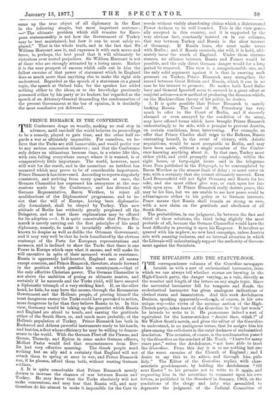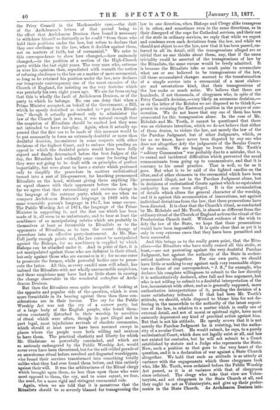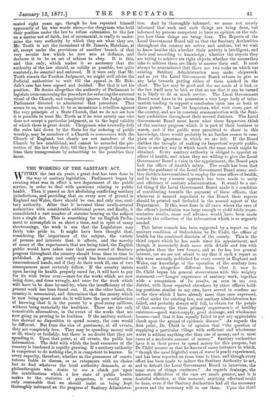THE RITUALISTS AND THE STATUTE-BOOK.
rpHE correspondence columns of the Guardian newspaper I furnish us with a sort of ecclesiastical barometer,.from which we can always tell whether storms are brewing in the High-Church party, the danger varying, as a rule, directly as the number and length of the letters on any single topic. Since the mercurial barometer fell for tempests and fiends, the ecclesiastical barometer has given analogous inclicetione of clerical storm and lamentation. And this •week Archdeacon Denison, speaking apparently—though, of course, in his• own unique way—the views of the extreme -section of the High- Church party, takes leave of the Guardian in "the last words" he intends to write to it. He pronounces indeed a sort of equivalent for the horror-stricken " Aroint thee, witch l" of Sir Walter Scott's novels, and gives the editor of the Guardian to understand, in no ambiguous terms, that he assigns him his place among the evil-doers in the outer darkness of eceles,inptical desolation. The occasion, of course, is the condemnation passed by the Guardian on the conduct of Mr. Tooth. "I have for many years past," writes the Archdeacon, " not been Able. to trust the Guardian. From this day it is to me nothing lint one of the worst enemies of the Church of England ; and I desire to say this to its editor, and through him pub- licly." The Editor of the Guardian replies, with char- acteristic good-humour, by holding the Archdeacon " till next Easter " to his promise not to write to it again, and requesting him in the meantime to comment upon hia,own letters, as published in the Standard in January, 186, on f the resolutions of the clergy and laity who Assembled to deprecate the judgment of - the Judicial Committee of
the Privy Council in the Mackonochie case,—the drift of the Archdeacon's letters of that period being to the effect that Archdeacon Denison then found it necessary to withdraw himself as distinctly as he could " from those who hold their positions under the law, but refuse to declare that they owe obedience to the law, when it decides against them, not on matters of faith, but of ceremonial." We refer to this correspondence to show how changed,—how ominously changed,—is the position of a section of the High-Church party within the last eight years. The very man who, extreme as were his opinions then, repudiated with warmth the notion of refusing obedience to the law on a matter of mere ceremonial, so long as he retained his position under the law, now declares our temperate contemporary one of the worst enemies of the Church of England, for insisting on the very doctrine which was precisely his own eight years ago. We are far from saying that this is wholly the fault of Archdeacon Denison, or of the party to which he belongs. No one can deny that when a Prime Minister accepted, on behalf of the Government, a Bill, which he openly described as intended to " put down Ritual- ism," though it actually professed only to administer the law of the Church just as it was, it was natural enough that the suspicion of Ritualists should be excited lest they were not intended to have fair-play. Again, when it actually ap- peared that the first use to be made of this measure would be to put summarily in force an extremely doubtful or more than doubtful decision, inconsistent in some respects with other decisions of the highest Court, and to enforce this pending an appeal in which the doubtful points would have been fully argued and finally determined before the best Judges of the
day, the Ritualists had evidently some cause for fearing that they were not going to be dealt with on principles of perfect impartiality, but were about to have a statute which professed only to simplify the procedure in matters ecclesiastical turned into a sort of life-preserver, for knocking pronounced Ritualists on the head, without giving them anything like an equal chance with their opponents before the law. So far we agree that that extraordinary and ominous change in the language of the extreme party, which we see when we compare Archdeacon Denison's language in 1869 with the same venerable person's language in 18/7, has some excuse. The Public Worship Act of 1874, the language of the Prime Minister in supporting it, and the first use which has been made of it, all seem to us unfortunate, and to bear at least the semblance of so manipulating rubrics which are probably in themselves at least as favourable to Ritualists as to the opponents of Ritualism, as to turn the recent change of procedure into an effective party-instrument. As Mr. Mac- Coll justly enough points out, the law cannot be manipulated against the Bishops, for no machinery is supplied by which Bishops can be attacked under it. And in point of fact, it is not manipulated against those who are deficient in their ritual, but only against those who are excessive in it ; for no one cares to prosecute the former, while powerful bodies care to prose- cute the latter. All this, as every candid man will admit, has imbued the Ritualists with not wholly unreasonable suspicions, and these suspicions may have had no little share in causing the change observable in the wonderful volte-face of Arch- deacon Denison.
But then the Ritualists seem quite incapable of looking at the opposite and popular side of the question, which is even more formidable in its bearing against them than these con-
siderations are in their favour. The cry for the Public Worship Act was not the cry of a narrow party, but of a large body of the English people, who found them- selves constantly disturbed in their worship by novelties of ritual which were often, though in part illegal and in part legal, most injudicious revivals of obsolete ceremonies, which should at least never have been restored except in places where the people were both willing and anxious to have them. The practical elasticity and liberty for which Mr. Gladstone so powerfully contended, and which are so seriously endangered by the Public Worship Act, would never even have been threatened, but for the self-willed parade of an unwelcome ritual before revolted and disgusted worshippers, who found their services transformed into something totally unlike what they had ever found them before, and this entirely against their will. It was the arbitrariness of the Ritual clergy which brought upon them, no less than upon those who were most opposed to them, the cry, and to some extent, we fear, the need, for a more rigid and stringent ceremonial rule.
Again, when we are told that it is monstrous that the Ritualists should be so severely blamed for transgressing the law in one direction, when Bishops and Clergy alike transgress it in other, and sometimes even in the same directions, as in their disregard of the cope for Cathedral services, and their use of the stole in ordinary services, we reply that while we regret and condemn even such deviations from the law, and while we should not object to see the law, now that it has been passed, en- forced in all its detail, still the transgressions alleged are so trivial that no one thinks about them, nay, that if the same triviality could be asserted of the transgressions of law by the Ritualists, the same excuse would be freely admitted. It is because the Ritualists take so much pains to accumulate what are or are believed to be transgressions of the law, till these accumulated changes amount to the transformation of a simple service into a ceremonial of a most elabor- ate and ostentatious kind, that their transgressions of the law make so much noise. We believe that there are hundreds, if not thousands, of clergymen who, in spite of the
Privy Council's decision,—very likely an erroneous decision,—
as on the letter of the Rubrics we are disposed so to think it,— persist in retaining the Eastward position in the prayer of con- secration. We do not know that any one of them has been prosecuted for this transgression alone. In the case of Mr. Ridsdale and Mr. Tooth, it cannot be questioned that there was an elaborate intention, which we do not believe that either of them denies, to violate the law, not merely the law of the the Purchas Judgment, but of other Judgments, which, as far as we know, have never been disputed by any one who does not altogether defy the judgments of the Secular Courts of the realm. We are happy to learn that Mr. Tooth's " solitary Communion " was probably due to a mistake, that is, to casual and incidental difficulties which prevented the usual communicants from going up to communicate, and that it is contrary to his usual practice. That is well, so far as it goes. But what is to be said of the lighted candles on the altar, and of other elements in the ceremonial which have been pronounced illegal, not in the Purchas Judgment alone, but in decisions of ecclesiastical Courts against which no equivalent authority has ever been alleged. It is the accumulation of details which alters the general character of the worship, and it is against this accumulation of innovations, not against individual deviations from the law, that these prosecutions have been directed. It is clear that the Church's ritual, as conducted by Mr. Ridsdale and Mr. Tooth, is almost as different from the ordinary ritual of the Church of England as from the ritual of the Presbyterian Church itself. Without evidence of the wish to defy the law of the State, we hope that these prosecutions would have been impossible. It is quite clear that as yet it is only in very extreme cases that they have been permitted and been successful.
And this brings us to the really grave point, that the Ritu- alists—the Ritualists who have really caused all this strife, at least,—are not protesting against the very doubtful Purchas Judgment, but against the authority of the State in ecclesi- astical matters altogether. For our own parts, we should have little or nothing to say against such very reasonable objec- tors as those of our correspondent, " J. S.," for example, who declares his complete willingness to submit to the law directly it is authoritatively declared, after full and free argument, but who is not willing to submit to a doubtful interpretation of the law, inconsistent with other, and as is generally supposed, more authoritative interpretations of it, pending the decision of a more satisfactory tribunal. If that had been Mr. Tooth's attitude, we should, while disposed to blame him for not de- ferring in the meanwhile to the authority of the latest exposi- tors of the law, in relation to a matter which is really one of external detail, and not of moral or spiritual right, have most earnestly deprecated any kind of practical action against him. But that is not his attitude. He openly avows that it is not merely the Purchas Judgment he is resisting, but the autho- rity of a secular Court. He would submit, he says, to a purely ecclesiastical Court, which does not legally exist at all, and has not existed for centuries, but he will not submit to a Court established by statute and a Judge who represents the State. Now, such a position as that goes to the very heart of the question, and it is a declaration of war against a State Church altogether. We hold that such an attitude is as utterly at variance with the engagements which those clergymen took who, like Mr. Tooth, were ordained before the Public Worship Act passed, as it is at variance with that of clergymen since ordained. The clergy who take that view are Volun- taryists, and not clergymen in the State Church at all, and they ought to act as Voluntaryists, and give up their prefer- ments in the State Church. As Archdeacon Denison inti-
mated eight years ago, though he has repented himself apparently of his wise words since,—for clergymen who hold their position under the law to refuse submission to the law on a matter not of faith, but of ceremonial, is really to under- mine the very authority by which they are what they are. Mr. Tooth is not the incumbent of St. James's, Hatcham, at all, except under the provisions of another branch of that very secular law which he now sets at defiance, and declares it to be an act of schism to obey. It is this, and this only, which makes it so necessary that the authority of the law should, as mildly as possible, but quite resolutely, be asserted and enforced. If it were only that Mr. Tooth resents the Purchas Judgment, we might well advise the Judicial authorities to wait till the appeal in Mr. Rids- dale's case has been argued and decided. But that is not his position. He denies altogether the authority of Parliament to legislate even concerning the procedure for enforcing the external ritual of the Church, and completely ignores the Judge whom Parliament directed to administer that procedure. That seems to us, we confess, to be so monstrous a rebellion against the very principle of a State Church, that we do not see how it is possible to treat Mr. Tooth as if he were merely one who does not accept a particular judgment, as to the legal validity of which there is great doubt. Clergymen who avowedly defy the rules laid down by the State for the ordering of public worship, may be members of a Church in communion with the Church of England, but clearly are not members of the Church by law established, and cannot be accorded the pro- tection of the law they defy, till they have purged themselves from their transgressions by submitting to the penalties they incur.








































 Previous page
Previous page